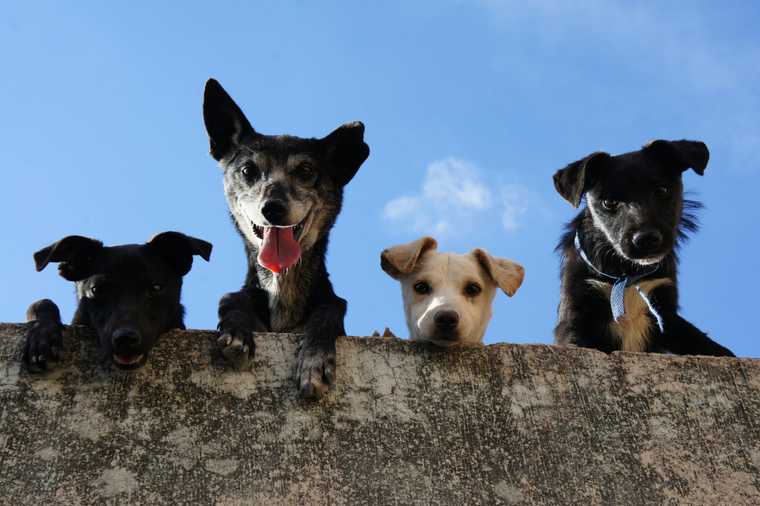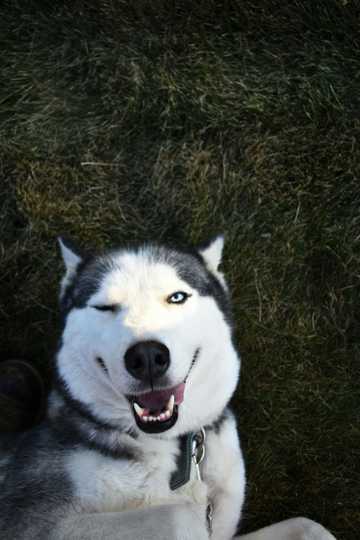Decipher Your Dog’s Secret Language: Why Do Dogs Howl?

Dogs are eager to communicate with humans, producing sounds and using various types of body language. If common behaviors like tail wagging, growling or barking are typical canine attributes, howling can catch dog owners off guard. Is the eerie howling sound a sign your dog is in distress?
Does your pup keep themselves entertained by doing it? Why do dogs howl at sirens or when they hear music on TV?
Are you eager to learn more about the psychology behind your dog’s behavior? Try the Woofz app! Professional training advice and tons of educational content in your pocket will help you form a unique bond with your four-legged pal.
You’re in the right place if you find your dog’s howling habits perplexing. Keep reading to learn more about the most common reasons behind domesticated dogs' howling and when excessive vocalization can indicate an underlying problem.
Why Do Dogs Howl: Top 5 Reasons
Howling is a vocal behavior deeply rooted in your dog’s ancestry. Dogs can produce this loud, heart-wrenching, and mournful cry like wolves. However, the reasons why your dog howls may differ from why a wolf in the wild does.
For wolves, howling is a way to deliver a message to other pack members over long distances. In other words. a wolf pack howls to keep track of one another.
Though a dog may howl for similar reasons, our four-legged companions grew closer to humans through evolution. As a result, howling started to carry out other communicative functions.
Here are some of the most common reasons behind your dog howling:

1. The need To stay in touch with the pack
It is easy to imagine a wild dog living in an actual pack howling. But why do domesticated dogs howl? Like wolves, home pups howl to stay in touch with other dogs, especially as a way to transfer messages over a long distance.
Howling can also inform others about a dog’s location and serve as an invitation to interaction.
2. The instinct to protect the territory from predators

Dogs can use howling to announce their territory to rival dogs, warn their owners about potential threats, or keep predators away. For this reason, one howling dog in the neighborhood can cause every dog in the immediate vicinity to start howling. It’s a fast and effective way for canines to let each other know who owns which territory.
3. A Reaction to a sound stimulus
You may notice your dog gets agitated and starts howling in response to a loud noise. Canines are famous for howling in response to changes in their environment. Possible triggers are loud music, blaring sirens, or other dogs howling.
This is often called “contagious howling” among dogs who live in urban areas. It doesn’t necessarily mean the dog dislikes the sound. On the contrary, it can be their way of showing they want to join in whatever is happening.
4. Underlying physical illness or discomfort
Some dogs howl to express pain and draw your attention to their poor physical state. If your typically quiet dog begins to vocalize more often than normal, it may be a response to physical discomfort or pain. Bringing them to the vet is essential to exclude any underlying health issues.

5. The desire to communicate strong emotions
Dogs may use howling to show various emotions. These can range from positive feelings, such as triumph or excitement, to negative ones, including fear, anxiety, and sadness. Howling can also function as a way to ask for human companionship.
Some pet parents notice that their fluffy friends tend to howl when they’re alone at home. So, why do dogs howl when you leave? Many canines experience separation anxiety, which can manifest itself as continuous howling in their owner’s absence.
If you suspect your dog is dealing with separation anxiety, look out for other symptoms of this condition:
- Pacing
- Whining
- Digging
- Scratching
Remember, you can help your dog tolerate your absence better by keeping them busy with various mental stimulation toys and activities. Check out the Home Alone Program provided by Woofz!
Why Do Dogs Howl in Response to Specific Stimuli?
Let’s focus on specific situations when most dogs start howling and discuss the patterns behind such behavior in more detail.
Why Do Dogs Howl at Sirens?
One of the reasons why dogs start howling when they hear the high-pitched sound of a siren is that they simply take it for an animal’s cry. They have a genetic predisposition to locate other pack members and verbally communicate with them, so they feel the urge to howl to communicate their location to other canines.
Another possible explanation is that dogs howl in response to an ambulance or a police vehicle siren because the sound is atypical for their environment. They may perceive the sound as indicating a potential danger and want to warn you as the pack leader about it.
Why Do Dogs Howl at Music?
Dogs have a good sense of pitch. It means music can affect them just like us. For example, classical music has a calming effect on dog behavior, while heavy metal tends to agitate them. As a result, howling can help dogs release the emotions evoked by musical pieces.

Some experts also believe that dogs can perceive music as a wolf chorus. Combining several instruments in different pitches can feel similar to a canine vocalization. Most pooches desire to howl when exposed to wind instruments, especially clarinets or saxophones.
Why Do Dogs Howl at Night?
Some pet owners have to deal with their dogs’ oversensitivity to the moon. If your canine companion developed a habit of howling at night, you might need an effective solution to eliminate this behavior.
One of the common factors contributing to night howling is a lack of stimulation during the day. Ensure your dog gets enough exercise for their breed and age to eliminate unwanted behavior.
What Breeds Are More Likely To Howl?
Generally speaking, breeds genetically closer to wolves are more likely to howl. They also frequently demonstrate other stress signals such as yawning, scratching their body, or licking their mouth.

Among popular breeds that are prone to howling, you can find:
- Siberian Husky
- Alaskan Malamute
- Beagle
- Dachshund
- Shetland Sheepdog
Most dog owners feel unease when their dog starts howling regularly or over a long time. Why do dogs howl at high-pitched sounds? After all, how can you know whether your canine companion howls to communicate with others of their kind or is struggling to tell you they’re in pain?
Indeed, excessive vocalization, including howling and barking, can indicate physical pain. However, you can watch out for other telling signs of discomfort canines usually demonstrate.
Signs your dog is in pain can include:
- Walking slower and reluctance to perform certain activities
- Restlessness and aggression
- Shaking and muscle twitches
- Disrupted sleeping habits
- Contact your vet for further assistance if you notice your dog displaying any behavior changes.
How Do You Stop Your Dog From Howling?
Once you ensure your dog’s howling habits aren’t caused by physical discomfort, you may wonder how to train your dog to keep quiet. Luckily, there are several ways you can stop your dog from howling:
- Encourage your dog to vocalize at your demand. You can teach a canine a simple “speak” command by rewarding them if they produce a sound after you clap.
When your dog grasps the command, praise them by giving them a treat. It will help your furry friend to associate howling or barking with a specific cue from you. As a result, they will stay away from this activity unless prompted to do so.
Pro Tip: You can facilitate communication with your dog by introducing hand gestures as a command. Try our brand-new hand signals program developed by an experienced dog training expert. Download the Woofz app to start correcting behavioral problems now!
-
Do your best to ignore howls. It may be challenging at first, but it’s essential to teach your dog the concept that howling doesn’t change your behavior and, therefore, it’s not a tool to manipulate you. Avoid shouting at your dog, as many find negative attention rewarding. Simply stay away from showing an emotional response and ignore the behavior.
-
Leave the room. If simply ignoring howling doesn't work, try leaving the room for a short time. You may play with your dog for a while or offer an additional treat before you go away. This way, your dog starts associating your departure with a positive experience and feels less urge to howl.
Final Thoughts
Howling is a natural form of communicating various needs your dog has. The closer your dog’s breed is to their wolf ancestors, the more prone they will be to excessive vocalization. Learning what your dog is trying to tell you by howling is essential to tackling such behavior. Remember to ensure your dog doesn’t howl because they’re hurt. If howling isn’t caused by physical discomfort, remove potential triggers or train your dog to stay quiet.
Written by

Woofz Content Manager with a deep passion for dogs and a strong affinity for positive reinforcement training methods.
Reviewed by

Experienced dog trainer with Bachelor of Science Degree in Animal Behavior. Diplomaed dog nutritionist. CFBA Accredited Canine Behaviorist